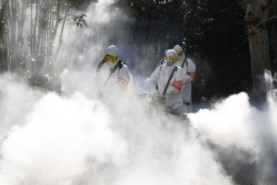Posted on 26 Mar 2020
The global pandemic caused by the COVID-19
outbreak has, aside from the obvious global health impacts, far-reaching
consequences – including on the economies, political systems and social fabric
of countries across the world. A concern that drives to the heart of how well
states will be able to respond to the pandemic is the role of organized crime
and the impact of transnational illicit economies.
Criminal enterprises will find both constraints
and opportunities from the disruption caused by the pandemic. In particular, criminal
groups will challenge local authorities and state institutions to meet the
needs of citizens, including the most vulnerable sections of society. It may
seem a peripheral issue, or too early to consider such ‘second order’ impacts
at the height of a public-health crisis. But as states invoke emergency powers
over the economy and security, failure to consider the longer-term implications
may prove critical.
For the next 12 weeks, the Global Initiative Against Transnational Organized Crime (GI-TOC) will publish a weekly #COVIDCrimeWatch newsletter. Rounding up a selection of news stories from the global press, the newsletter will explore existing and emerging interactions between COVID-19 and the illicit economy. It will also include analysis and investigations drawn from our own GI-TOC field and expert networks.
This week, we share with you our initial policy brief, bringing together all that we are seeing in terms of how criminal networks are reshaping around this disruptive event. We also present the best from the web, exploring some of the ways in which social distancing creates both opportunities and obstacles for organized crime, as well as one welcome consequence of the lockdown imposed in a country with a history of mafia activity.
Mexico’s criminal groups start to feel the pressure
InsightCrime, 18 March 2020
While organized crime in Mexico is most frequently associated with the country’s famous drug cartels, the importance of the counterfeit goods market must not be underestimated. Criminal groups that make vast sums of money by importing counterfeit clothes, jewellery and accessories from China are facing a serious strain on their business model. With Chinese authorities banning air travel into the country, these groups, of which La Unión de Tepito is among the most prominent, are no longer able to secure access to the counterfeit goods. Many businesses that purchase these goods are now threatening to stop paying extortion fees.
For groups that rely on both a narrow range of illicit activities and the continuation of international traffic, the coronavirus pandemic may very well constitute an existential threat. Furthermore, as the economy contracts, criminal groups reliant on micro extortion payments – such as the gangs of El Salvador and Honduras, or the mafia groups of southern Italy – may see their incomes constrict severely.
VIRTUAL ATTACKS go into overdrive
The Conversation, 24 March 2020
Countries all over the world are being targeted by hackers
using coronavirus-themed malicious apps and websites. In Australia, at least 94
reports of different coronavirus-related scams have been recorded as more and
more people are shifting to remote working, and use computers and networks that
are often far less secure than corporate-supplied devices. These attacks, often
in the form of malicious apps and websites, or phishing emails, are used to
steal personal and financial data from unsuspecting victims.
Cybercrime is a realm of organized crime that has been rising in prominence over the past decade or so, and online criminal activity is increasingly attracting much-needed attention. With more and more people consigned to significant periods of time isolated at home, increasingly reliant on the internet for both work and social contact, we may well see cybercriminals and fraudsters step up a gear. At the same time, as people become increasingly bored, lonely and economically constrained, they may become more attracted to illicit industries (including online child sexual exploitation), more vulnerable to scammers and romance fraudsters, and more likely to seek contraband goods online.
Healthcare systems may not be the only ones to step up recruitment
The Telegraph, 21 March 2020
The Telegraph reports a worrying new trend in the UK, whereby
individuals congregate around cashpoints to sell drugs to people who are withdrawing
money amid mass panic-buying. These drug dealers reportedly wear medical masks
to evade police detection.
When circumstances change, criminal actors adapt – as seen in the stories outlined above. But donning medical masks isn’t the only way in which criminal entrepreneurs may exploit the coronavirus outbreak. With schools all over the world shutting down for the foreseeable future, there is a risk that gangs may embark on a recruitment drive, targeting vulnerable young individuals who are no longer in school. Bored youth who have nothing to occupy them are more likely to shift into criminal opportunism, or even be forced by their families into criminality or exploitation in order to boost household incomes. Blue Dragon, an anti-trafficking NGO in Vietnam that is supported by the GI-TOC Resilience Fund, has warned that children being pulled out of school risk being sold into arranged marriages, or made to participate in forced begging or domestic servitude by their families.
Pangolins no longer wanted
Le Temps, 16 March 2020
Until recently, pangolins – thought to be the
world’s most trafficked animal – were a prized item in the marketplaces of
Libreville. However, with news emerging that pangolins may have played a
crucial role in the transmission of COVID-19, the sellers in Gabon’s capital
city have lost most of their best clientele – namely Chinese consumers.
While the trade of pangolins has
been illegal in Gabon for many years, China – from which the overwhelming
majority of the demand for pangolin scales and meat originates – has now banned
all trade and consumption of wild animals in an attempt to contain the spread
of the virus. If there is one positive to take from the global pandemic, it
could be that a long overdue shift in attitudes towards the global wildlife
trade may now finally take place, as policymakers recognise the impact of the
trade, both licit and illicit, from a biosecurity and public-health
perspective. Conservationists and citizens alike have been calling for the wildlife ban to be made permanent. While it is
clear that there is sufficient capacity to address illegal wildlife-trade
markets, now is the time for China to show it also has the political will.
At the same time, however, poaching and trafficking groups who have earned a healthy profit from catering to the traditional Chinese medicine (TCM) trade are reluctant to see that revenue stream dry up. According to our research in Southern Africa, criminal groups are pushing harder than ever to sell rhino, ivory and other endangered species as a miracle cure for the novel virus. Wildlife traffickers in Laos and China are also getting in on the action, peddling fake cures containing rhino horn and other endangered species products.
Mafia fugitive smoked out of hiding
Huffington Post Italia, 13 March 2020
Mafia
fugitive Cesare Cordi experienced the perils of smoking first hand when he was
captured by police thanks to the faint glow of a cigarette coming from a small
villa, thought to be vacant. The Carabinieri
from the Calabrian municipality of Locri tailed a man who was bringing the ‘Ndranghetista
supplies, before finding him in the small village of Bruzzano Zeffirio.
With Italy on full lockdown, having overtaken China as the country with the highest number of coronavirus-related deaths, travel is severely restricted. As such, any movement of people is enough to cause suspicion among law enforcement. As entire populations are forced indoors, criminal activity could stick out like a sore thumb. Our GI-TOC networks in the Balkans note a significant reduction in street violence and crime, as police patrols have forced wary criminal groups to put their most visible and nefarious acts on hold.



